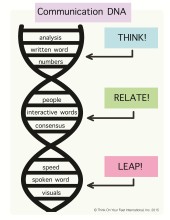Communication
5 Tips for Vacation Communication

Your next vacation doesn’t have to cause a wave.
We weren’t meant to spend the summer cooped up inside an office. In fact, many companies are now advocating for a balanced lifestyle and are encouraging their staff to take advantage of available vacation days.
After all, these are the months to get outside and enjoy a world beyond your cubicle.
But with great vacations comes great responsibility. And just as you would prepare for a meeting, you should also prepare for your absences. Far too often a vacation can interrupt an important project, deal or client relationship and derail the progress of your team. However, this process can also flow smoothly if you take the right steps.
It all depends on how effectively you communicate with your colleagues, your clients and yourself.
Let’s explore the 5 Best Tips for vacation communication:
Give notice about your vacation well in advance
Whether you’ve booked your vacation a year or a month in advance, your team deserves a fair warning about your travels. Consider the amount of stress and inconvenience you may impose on your colleagues with a last-minute announcement about your two-week trip to Iceland, a week before you board the plane. Everyone needs time to prepare – yourself included. After all, these are the colleagues who will absorb your workload while you’re away.
We recommend giving everyone at least one month notice if possible, especially if you have a larger role within your organization. Set reminders in the weeks and days leading up to your departure so there are no surprises to a forgetful or busy employee. Don’t catch anyone off guard; open dialogue is a must.
Delegate jobs and tasks in your absence
Leave no stone unturned. Over-prepare for every possible situation, task or crisis. Pull colleagues aside and ask them to take over specific responsibilities and be sure to train them thoroughly on the work you are leaving them with. Is someone stepping into your client meetings? Brief them on specific client needs and details. Will someone take over a special project for you? Give them a detailed list of what needs to be completed.
Prepare a relief document outlining where specific files are located, who to talk to about certain projects or what to do in the event of an emergency. You don’t want to be bombarded with panicked emails while you lay on the beach. It’s better to be safe than sorry and leave your projects in capable hands.
Set up clear out-of-office voicemail greetings and automatic email replies
Your team may know your whereabouts, but your clients or contacts likely will not. We highly recommended reaching out to important contacts and alerting them of your vacation.
Construct a clear and impactful voicemail greeting and include the dates of your vacation and return. Leave an alternate contact that can address your client’s enquires and take care of any pressing matters before you leave. There is nothing more annoying on the client’s side than receiving a vacation notification in the middle of an important project without notice.
More importantly, if you’re providing an alternate contact in your out-of-office messages, be sure to get their permission in advance. This will prevent awkward encounters and ensure your co-worker is well aware that they may be called upon.
If you do email while on vacation, be sure to keep all communication brief and to the point
No one enjoys writing long emails on their smartphone. Similarly, reading run-on emails sent from a mobile device can be a frustrating experience. Despite our best intentions, they’re often full of auto-corrected typos and have than less than ideal formatting.
When responding to an email on vacation (although we advise against it whenever possible), keep all written communication short and concise. Think about your greater message, structure it into a few key points and relay that message back to your team. Point forms are ideal, and always be sure to summarize your argument at the end of the email to reinforce the message. This prevents follow-up questions so you can get back to relaxing.
Don’t skip a beat! Have a plan to slide right back into work
Returning to the office after a vacation can often be a job within itself. You arrive back to a pile of email threads, missed calls, memos, status updates, potential issues, pressing questions and a staff who expect you to jump right back in where you left off.
Plan ahead for all your post-vacation tasks and execute them the moment you walk into the office. We suggest arranging a catch-up meeting with a few members of your team to discuss what occurred. Organize your email inbox and tackle the most pressing issues first. Keep an open and honest dialogue with your team so you can go over all details and progress on projects or tasks that you missed.
The better you communicate the more effective and productive your team becomes!
A vacation is meant to help balance your life with the ever-demanding responsibilities of your career. Your health and well-being is important. Don’t be afraid to unplug and wind down – just make sure you use our advice on vacation communication.
Learn how to become an effective communicator and learn to organize your thoughts and ideas with Clarity, Brevity, Impact®. Sign up for a Think on Your Feet® public workshop this summer in Toronto! Get out of the office and learn one of the most important life skills – communication.



